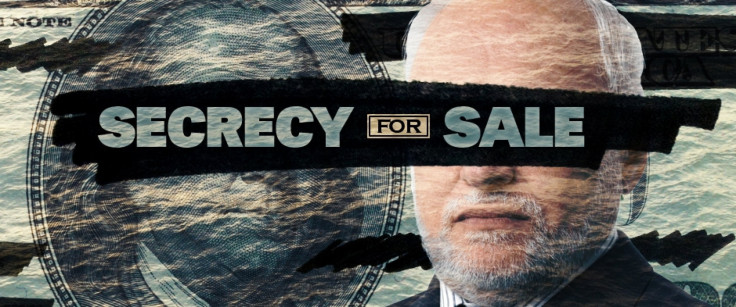International Consortium Of Investigative Journalists Releases “Secrecy For Sale: Inside The Global Offshore Money Maze”

The International Consortium of Investigative Journalists (ICIJ) has released the largest investigative reporting project in its 15-year history: “Secrecy For Sale: Inside The Global Offshore Money Maze.” Drawing from 2.5 million secret files, the organization helmed “what may be the largest cross border journalism collaboration in history,” it notes on ICIJ.org.
The findings explore the concealed world of tax havens, cracking open the secrets of more than 120,000 offshore companies and trusts and almost 130,000 individual in over 170 nations. Top-tier banks such as Clariden, UBS and Deutsche Bank have enabled customers to have secret companies in many offshore locations, the project reveals.
Exposed are individuals associated with covert business dealings in the Cook Islands, the British Virgin Islands, Singapore, Azerbaijan, Russia, Canada, Pakistan, the Philippines, Thailand, Mongolia and many other places. U.S. doctors, Greek villagers, Russian executives, shady Wall Streeters, billionaires from Eastern Europe Indonesia, dealers of international arms and family members of dictators have been able to employ intricate offshore structures to own mansions, yachts, art and other assets while gaining tax advantages and anonymity “not available to average people,” the ICIJ points out.
“A well-paid industry of accountants, middlemen and other operatives has helped offshore patrons shroud their identities and business interests, providing shelter in many cases to money laundering or other misconduct,” the ICIJ reports, adding that ponzi schemers and other mega-fraudsters are among the tricksters who've often used “offshore havens to pull off their shell games and move their ill-gotten gains.”
The gathering of documents represents the largest inventory of inside information about the offshore system ever obtained by a media organization, ICIJ maintains. The full size of the files, measured in gigabytes, is more than 160 times larger than the leak of U.S. State Department documents by Wikileaks in 2010.
“The files illustrate how offshore financial secrecy has spread aggressively around the globe, allowing the wealthy to avoid taxes, fueling corruption and economic woes in rich and poor nations,” ICIJ notes. “The current banking crisis in Cyprus is one example of how the offshore system can impact an entire country’s financial stability.”
The ICIJ, founded in 1997 as a project of the Center for Public Integrity, a Washington D.C.-based non-profit, worked with 86 investigative journalists from 46 countries to crunch high-tech data and report the old-fashioned way. The organization collaborated with journalists from The Washington Post, the Canadian Broadcasting Corporation (CBC), The Guardian and the BBC in the U.K., Le Monde in France, Süddeutsche Zeitung and Norddeutscher Rundfunk in Germany, and 31 other media outlets.
The ICIJ identified Maria Imedla Marcos Manotoc, eldest daughter of late dictator Ferdinand Marcos of the Philippines, as a beneficiary of a British Virgin Islands (BVI) trust. After learning of this, Philippines officials “said they were eager to find out whether any assets in the trust are part of the estimated $5 billion her father amassed through corruption,” ICIJ notes.
Canadian class-action lawyer Tony Merchant was careful to maintain the privacy of a Cook Islands trust that he had stocked with over $1 million in 1998, ICIJ reports. “In a filing to Canadian tax authorities, Merchant checked ‘no’ when asked if he had foreign assets of more than $100,000 in 1999,” court records show. From 2002 and 2009, he often paid fees to maintain the trust “by sending thousands of dollars in cash and traveler’s checks stuffed into envelopes rather than using easier-to-trace bank checks or wire transfers, according to documents from the offshore services firm that oversaw the trust for him,” ICIJ notes.
Others identified in the offshore data include the wife of Russia’s deputy prime minister, Igor Shuvalov, and two high-level executives with Gazprom, a Russian government-owned corporation that’s the world’s largest extractor of natural gas. Then there's Carmen Thyssen-Bornemisza, a Spanish baroness and art collector, had used a firm in the Cook Islands to buy artwork (including a Van Gogh) through auction houses such as Sotheby’s and Christie’s.
Nearly 4,000 individuals from the U.S. are mentioned in the report. One of them is Denise Rich, a Grammy-nominated songwriter whose ex-husband “was at the center of an American pardon scandal that erupted as President Bill Clinton left office,” according to ICIJ. Rich had $144 million in April 2006 in a trust in a Cook Islands trust, records obtained by the ICIJ show.
Meanwhile, James R. Mellon, a member of the Mellon dynasty that launched companies like Gulf Oil and Mellon Bank, and an author of books about Abraham Lincoln and Thomas Mellon “used four companies in the BVI and Lichtenstein to trade securities and transfer tens of millions of dollars among offshore bank accounts he controlled,” ICIJ reports. Mellon told ICIJ he owned “a whole bunch” of offshore companies but has since disposed of them. He set up the firms for “tax advantage” and liability reasons. “But I have never broken the tax law,” he said. Of the use of nominees, Mellon noted that “that’s the way these firms are set up,” and that it’s useful for someone who travels a lot to have someone else in charge of his businesses. “I just heard of a presidential candidate who had a lot of money in the Cayman Islands,” he said. Mellon was “alluding to former U.S. presidential candidate Mitt Romney,” ICIJ notes.
Also investigated was Nalineed “Joy” Taveesin, Thailand’s international trade representative who used Singapore-based TrustNet to set up a secret firm in the BVI, the records reveal. “Taveesin acquired her BVI company in August 2008,” ICIJ reports. “That was seven months after she’d been appointed an advisor to Thailand’s commerce minister -- and three months before the U.S. Department of Treasury blacklisted her as a ‘crony’ of Zimbabwean dictator Robert Mugabe.”
Freezing her U.S. assets, the Treasury Department accused Taveesin of “secretly supporting the kleptocratic practices of one of Africa’s most corrupt regimes.”
© Copyright IBTimes 2024. All rights reserved.











